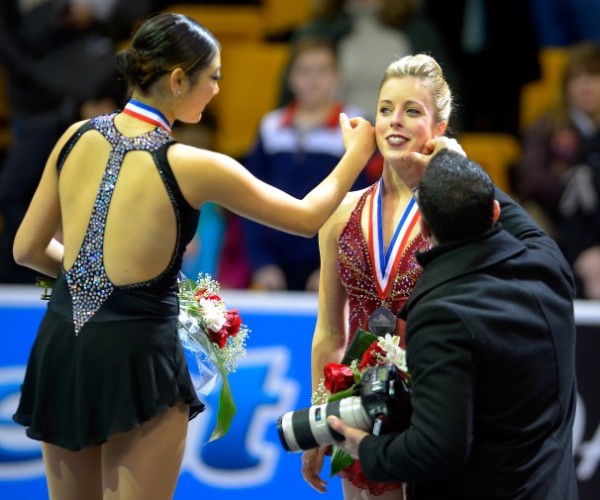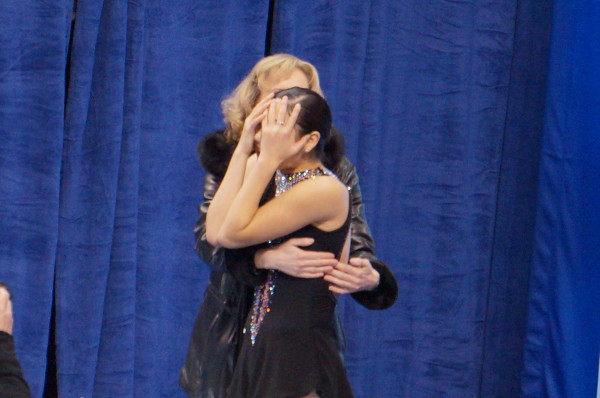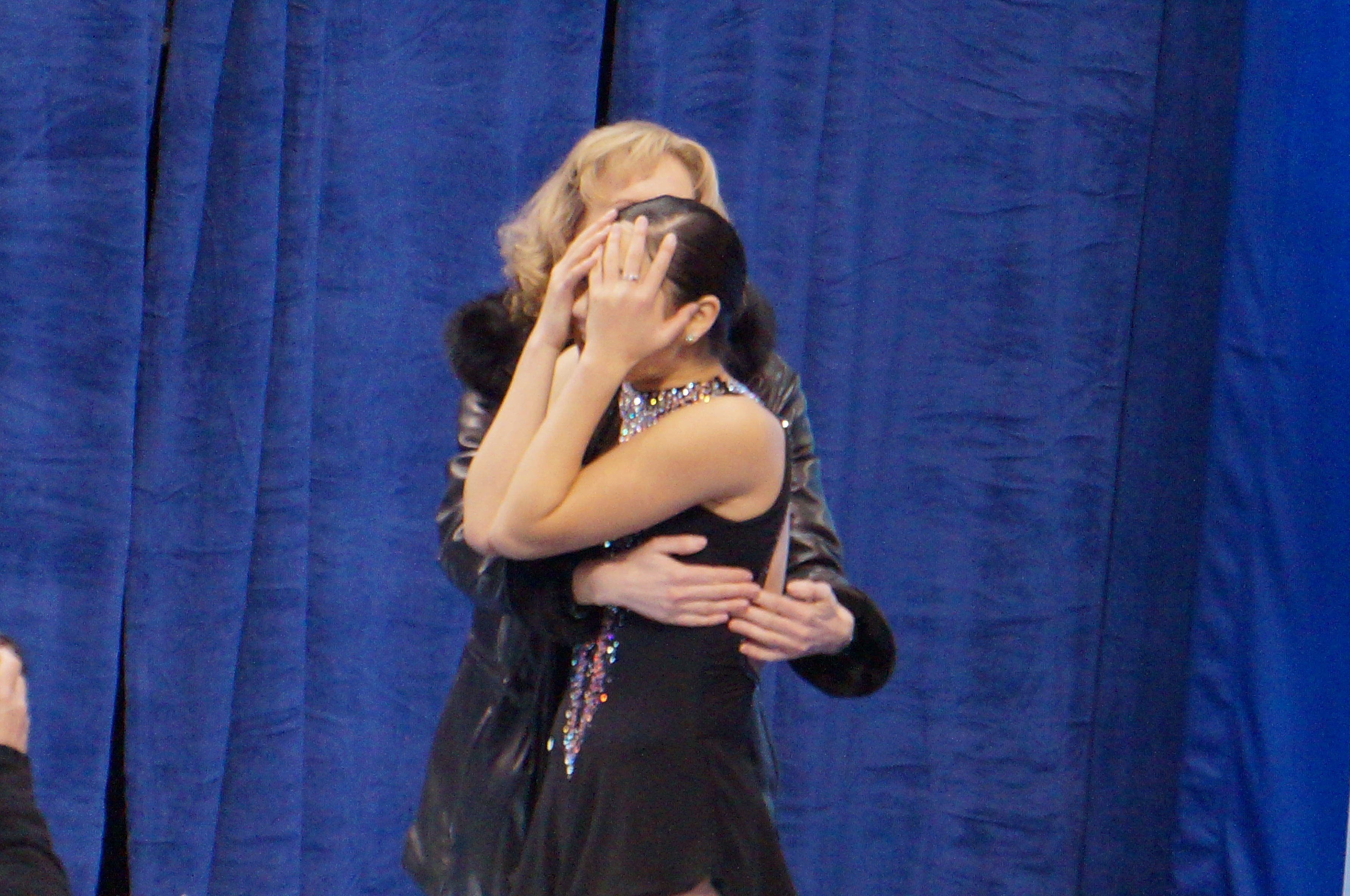
Mirai and an official photographer wipe tears off Ashley’s face at Nationals (Photo credit: Washington Post)
By Eugene Hung
“Not being chosen to represent the United States at the Olympic Games in Sochi and at the 2014 World Championships in Japan has been extremely disappointing to me, and it has been very difficult for me to process. … [It] was devastating and I remain confused by US Figure Skating’s decision.”
So said Mirai Nagasu via Facebook comments posted around 3 A.M. on January 30, breaking her long English-language media silence on the controversy we’ve followed for four weeks. (She had spoken briefly to Japanese network Fuji TV while at the Four Continents Championships in Taiwan.)
She’s not the only one who’s confused. Her numerous supporters, along with many journalists, longtime figure skating observers, and figure skating fans, have also been shaking their heads, trying to make sense of it all.
Of course, no one, least of all Mirai, is confused about how U.S. Figure Skating officials justified their decision to leave her off both the Olympic and World Championship teams. Her third-place finish at Nationals was never, according to U.S. Figure Skating’s rules, going to guarantee her a place on them. The decision was based on a comparison of each skater’s 2013-14 “body of work,” meaning each skater’s results in certain major competitions during that time period.
So on this, no one is confused; U.S. Figure Skating officials were operating within their rights when they left Mirai off those teams. The skating federation’s powerful International Committee Management Subcommittee (ICMS), the nine-member group that actually makes the selections, did indeed follow their rules, based on the letter of their law.

photo credit: nabechiko29 via photopin cc
You’ve Got Questions, We’ve Got … (Crickets)
But did they follow the spirit of their law? Was their decision-making process truly fair and ethical? That’s the big question. And this is where things get confusing, because the big question raises many additional questions, none of which have answers yet. Questions like:
1. Why did U.S. Figure Skating officials go into silent mode? Since they left Boston after Nationals, not a single federation rep seems to have granted an interview about the controversy. (If they have, Google and Bing couldn’t find it. I’ll try the NSA next.) Surely a number of reporters have asked! In fact, the questions voiced by journalists on the subject have been met with a wall of silence, with the exception being the federation’s straw man statement in the Wall Street Journal. (That’s the one where U.S. Figure Skating’s communications director dodges Jeff Yang’s contention that marketability won out. Instead, the statement essentially says, “We’re not racists! Look at our Asians! Got binders full of ‘em!”) The silence leads us to wonder, what don’t they want to discuss on the record?
2. Why did ICMS members apply the “body of work” criteria inconsistently? On page 6 of U.S. Figure Skating’s selection rules, each skater’s performances in thirteen specific competitions, ranked in a particular order of importance, are the only basis by which subcommittee members should make their picks. Ashley Wagner medaled in three of the five qualifying events in which she competed. If members deemed Ashley’s “body of work” good enough to bump Mirai, Mirai’s should have been good enough to bump Polina. After all, Mirai had two third-place finishes among the more important of those thirteen events, while Polina barely edged her at Nationals and also had a fourth-place finish in the least important of the thirteen events. Why not treat Mirai like they treated Ashley, and send Gracie Gold, Mirai, and Ashley to Sochi? Perhaps U.S. Figure Skating could give us an answer, but all we hear … are … crickets.
3. Why did ICMS members handle the Worlds team selections inconsistently? If I’m parsing Mirai’s Facebook statement correctly, this is one of the questions that has most thrown her for a septuple-toe loop. ICMS members gave consolation prizes to the male skater and pairs duo that were relegated to 1st alternate for the Olympic team; they placed them on the team for Worlds. Nice gesture, right? But Mirai, named 1st alternate for the Olympics in the women’s division, did not receive the same treatment. Instead, ICMS members stuck her at 1st alternate for Worlds, too. Why the inconsistency?
What makes this even more baffling is that next month’s Worlds will be held in JAPAN. She has many fans there(!), and she even trained there in the run-up to her successful Nationals performances(!!). Moreover, that’s where Mirai’s parents are from(!!!), and where Mirai herself holds dual citizenship(!!!!). If U.S. Figure Skating’s mission is to win medals, medals, medals, as its website suggests, then why not send a peak-form Mirai to JAPAN, where she’s popular and would have a cheering crowd behind her to influence the judges? Why instead the glaring snub for Worlds, too?
4. Why were ICMS members so determined to put Ashley on the Olympic team? USA Today’s Christine Brennan reported that even before the women’s competition at Nationals was completed, two sources close to the selection process told her Ashley would be picked “even if she came in 10th.” By doing so, surely ICMS members knew they would be selecting, for the first time in U.S. Figure Skating’s history, someone who finished out of the top three at Nationals and was not injured. Surely ICMS members also knew they would face an outcry. Yet they were prepared to pick Ashley despite precedent and pushback – and practically speaking, despite the results at Nationals, too. If they were so set on choosing Ashley, come hell or high water, we’re right to ask if more than just athletic performance drove her selection – and to also wonder if other skaters truly got a fair shake.
5. Isn’t it a conflict of interest that both U.S. Figure Skating and Ashley have endorsement deals with Procter & Gamble and Hilton HHonors? Those two companies are top-level sponsors for the federation, meaning there is a major financial incentive for U.S. Figure Skating to send Ashley to the Olympics. (There also would have been incentive to send Gracie Gold, herself a Procter & Gamble endorser, but no one disputes her right to be on the team.) Ashley’s presence in Sochi means more ka-ching at cash registers for Procter & Gamble and Hilton HHonors, which can only help U.S. Figure Skating. That’s because greater financial vitality for those companies means a greater chance they’ll stay on as federation sponsors, and perhaps a higher chance that they’ll send more money its way. Did this figure into the decision?
It seems like some U.S. Figure Skating officials may need a reminder. This comes from U.S. Figure Skating’s own “Principles of Ethical Behavior and Conflict of Interest,” published in 2004:
Those who choose to serve the United States Figure Skating Association (U.S. Figure Skating), whether as volunteers or paid professionals, are held to the highest standards of conduct. … What may be considered acceptable conduct in some businesses may be inappropriate in Olympic service.
Those who serve U.S. Figure Skating must do so without personal gain, must avoid any institutional loss or embarrassment, and must behave in such a way that the organization’s trust and public confidence are enhanced. It is important to avoid any real conflict of interest as well as to avoid even the appearance of a conflict of interest.
Enhancing public confidence? Avoiding even the appearance of a conflict of interest? Maybe in a parallel universe, but not this one.
6. Are there financial conflicts of interest for ICMS members? Ashley’s list of major corporate sponsors is long – the aforementioned Procter & Gamble and Hilton HHonors, plus BP (formerly British Petroleum), Cover Girl, Nike, Pandora Jewelry, and insurance carrier Highmark. Given the popularity of mutual fund investing, it seems likely one or more ICMS members had some stock interest in one of these companies, and thus, stood to gain by choosing her. Widen the circle of influencers to the entirety of U.S. Figure Skating’s International Committee, the 35-member group that approves the subcommittee’s nominations, and it seems nearly certain that someone there had something to gain. Avoiding even the appearance of a conflict of interest? Is there an echo in here?
7. Did anyone from NBC or Ashley’s corporate sponsors lobby U.S. Figure Skating for her inclusion? Although it seems crude, it doesn’t feel outlandish for a coach to pressure ICMS members to pick his/her skater. But if a corporation does so, the process feels tainted, even dirty. Now, we know NBC and Ashley’s sponsoring companies had placed large financial bets, as it were, on her making the Olympic team. And NBC had also just lost skier Lindsey Vonn as one the faces of its coverage. With all that big money at risk, it’s easy to imagine that at least one or more of these companies had someone who made a call or sent an email, text, or tweet to federation officials. To be clear, no one has come forward with a “smoking gun” proving that such lobbying took place. But given the financial stakes, and that these companies (except Highmark) are for-profit entities driven by the bottom line, many fans are wondering.
All of these questions lead us back to the original big one – was U.S. Figure Skating’s process of picking teams truly fair and ethical? I’d like to think it was. But until we have answers – and I ask the journalists out there for help in finding them – many of us, myself included, will believe it wasn’t.
To recap: U.S. Figure Skating officials stopped talking about the controversy after Nationals; it seems there’s something they didn’t want to talk about. When they did make a statement in the press, they dodged the question of whether dollars and sense – marketing sense, that is – factored into their team selection. Their selection subcommittee treated Mirai inconsistently relative to other skaters by leaving her off not only the Olympic team, but also the Worlds team, which competes next month in JAPAN(!!!!!). The ICMS was strangely determined to pick Ashley, almost regardless of the results at Nationals. And, in addition to the apparent financial conflicts of interest for the federation to choose Ashley, it’s just plain hard to believe that absolutely no one from her corporate sponsors or NBC lobbied U.S. Figure Skating for her inclusion.
These questions won’t go away. But even after the Sochi Olympics are over, more than just unanswered questions will remain. Mirai’s double snub will have other ongoing consequences, too.
After the Flame Goes Out
I’m convinced that even after these winter games are declared closed, what happened at Nationals will still matter. Certainly, it will matter to Mirai and to many who care about figure skating as a sport. Hopefully, it will also be a concern for members of U.S. Figure Skating’s Ethics Committee. (Don’t laugh; this isn’t a joke! There really is one!)
It will also matter to highly talented, rising Asian American skaters, working hard to follow in Kristi’s, Michelle’s, and Mirai’s salchows and toe loops. They’ll know that there have been Asian American champions in the past. They’ll look around and see many Asian Americans involved in the sport overall. But sadly, some of them will also realize that what happened to Mirai could happen to them, too. They’ll wonder if they will have to win their competitions by clear margins. They’ll suspect that if it’s a close call between one of them and a comparably talented White skater, then the White skater will have an advantage.
Mirai’s double snub will also be important to parents of little Asian American girls “skating” across their living rooms while watching these Olympics. Some of these girls will ask to enroll in lessons. And some of their parents will remember what happened to Mirai and decide to say no, hoping to steer their daughters toward sports that aren’t so subjective. They already know that Asian folks have to work harder in certain contexts than White folks to get ahead, and they want to spare their daughters the potential heartache.
Yes, what happened to Mirai will continue to matter, especially to Asian America. It will serve as a sobering reminder that we still have a ways to go to achieve equality with White Americans in our society.
Oh, we have it in theory. But in practice, we have it merely in part, especially when it comes to issues of influence (often measured in dollars) and justice. It’s still easier for White Americans, generally speaking, to get access to people in power; it’s part of what’s known as White privilege. The “shiny happy people” sort of moment that we saw in the Coca-Cola Super Bowl commercial is still an ideal that’s far from being actualized.
There was a recent time when many of us hoped that moment was tantalizingly close. If, right at this moment, we flux capacitized ourselves 24 months into the past, we’d land in February 2012, the month Linsanity erupted worldwide. It was a special time for many of us, even a weepy one. (Remember Jeremy’s three at the end of the Toronto game? Waterworks.) We saw a son of Asian America breaking through the stereotype that Asian men can’t jump. Many of us felt like we Asians had finally “arrived” in the world of major American sports. Beyond that, many of us dared to hope that Jeremy’s success could help open all sorts of doors that typically had been difficult for Asian Americans to push through. (Many of us really did; just Google it and scan through some articles from the time.)
But in Boston, a competitor’s connections off the ice put Mirai at a disadvantage on the ice, or as veteran sports writer E.M. Swift said, “The playing field at Nationals wasn’t level.” As Jeff Yang argued in the Journal and later at Medium.com, marketability won out. And again, marketability in our country comes more easily, in general, for White Americans than for Asian Americans.
So Mirai’s experience brings us back to reality from the overly optimistic halcyon days of Linsanity. It reiterates to us that the struggle to empower Asian Americans has no fast track. Like all endeavors for justice, it will continue to be a long, grinding journey of small steps forward (like Jeremy’s breakthrough) – and sometimes backward (like Mirai’s experience at Nationals).
All this is not to say that progress isn’t happening now. Many Asian Americans are thriving in fields where we are few. A lot of people, including many new friends I’ve made in the last year, are doing a lot of advocacy work to empower Asian Americans, resulting in a lot of good.
Yet the pursuit of racial justice is still going to be the work of a lifetime. We will plug away at it, and we will hand the torch off to the next generation. As a dad who sees everything in society through the filter of how it will affect his young daughters, I hope I’ll do my part well and that you will, too. Together, we can help our society become a healthier one for our next generation to experience.
Now, please don’t take what I’ve said as meaning I’m hostile toward White folks. Some of my best friends are White! (Seriously, my closest buddies these days are!) I hold no animus against White people, nor do I wish to bring them down. What I desire is to lift up my fellow Asian Americans, especially when justice is denied them.
And while I’m in disclaimer mode, let me be clear: we shouldn’t blame Ashley or the other women on the team for Mirai’s pain! They’re all wonderful skaters, with Ashley being the most accomplished among them. They deserve our support, even as Mirai is rooting for them, because they’re our fellow Americans.
And I firmly believe they haven’t done anything wrong. Our ire shouldn’t be channeled toward them! It needs to be directed at the folks at U.S. Figure Skating who have treated Mirai unfairly, and at the system which has, as columnist Lindsay Gibbs writes, “made an athletic competition look like a popularity contest.” Like I’ve said before, I started #MiraiEarnedIt to lift her up, not to bash anyone else!
So troubling questions remain about why Mirai was left off the Olympic and Worlds teams. There will be other lingering, perhaps even long-lasting, effects as well, particularly for the Asian American community. As Mirai readies herself for another four-year journey to prepare for the 2018 Winter Olympics in South Korea, we are reminded that the work on behalf of our Asian American peoples is a long road as well. We take inspiration from Mirai, who says on Facebook that her double snub will “renew a fire inside of me.” I pray that the fire inside of us is renewed, too, that we might persevere in the good fight …
So that Asian parents some day won’t worry about whether their daughters and sons will get a fair shake, whether in figure skating or anything else …
So that Asian American young people won’t wonder if the color of their skin puts them at a disadvantage, whether on the ice or anywhere else …
And for me, so that my daughters can grow up in a world that no longer needs a hashtag like #MiraiEarnedIt.
This post was originally published at Asiance Magazine and was republished on 8Asians with permission.
ABOUT THE AUTHOR: In addition to writing for Asiance, including the Raising Asian American Daughters blog, Eugene is now serving as the West Coast organizer for the Man Up Campaign, which works globally to mobilize young men as advocates against the violent treatment of women and girls. Chat with him on Twitter via @iaurmelloneug.





